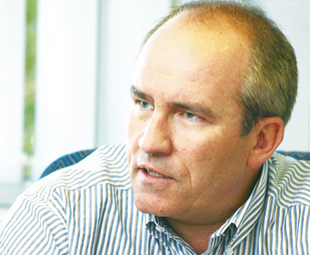Mercedes-Benz on a winning streak

Mercedes-Benz Commercial Vehicles is the envy of many local truck and bus manufacturers… and for good reason. Whether the market in its totality rises or falls, Mercedes-Benz continues to dominate the commercial vehicle sector.
The latest commercial vehicle sales figures read like a Mercedes-Benz success story: the company dominates, with a monster market share of 31.8% for the first six months of 2010 (over 3.5 t market). This is an improvement of 6.6% over the same period last year. All three brands in the stable – Mercedes-Benz, Freightliner and Mitsubishi Fuso – are justifiably holding their heads up high. Mercedes-Benz has grown its market share by 5.1% versus the same period last year, while Freightliner and Fuso are up 0.6 and 0.9% respectively.
Some of the brands’ success can be attributed to the World Cup. “While the event did not have a measurable influence on sales of our trucks, we’ve had very good results in our van and bus businesses. It was so good to see the visitors transported in locally assembled and produced Mercedes-Benz buses while the teams were transported in fully imported competitor products,” comments Kobus van Zyl, vice president commercial vehicles at Mercedes-Benz South Africa (MBSA), with one of his characteristic chuckles.
But there are various other reasons for the success of Mercedes-Benz Commercial Vehicles, as Van Zyl notes. “I believe that our escalating sales are due to the fact that the company has harnessed its ownership of the value chain. We offer services such as CharterWay, a set of vehicle leasing, maintenance and servicing products modelled specifically for the fleet owner. This is coupled to the ideal product for each application, a sound after-sales offering and a well-trained dealer network. This means that we can exceed customer expectations and ensure the uptime, availability and reliability of vehicles on behalf of our customers,” he tells FOCUS.
So let’s take a look at the success of the product range, which continues to win awards the planet over (the Actros, for instance, was recently named Truck of the Decade in Great Britain). At the top end of the market, extra-heavy Mercedes-Benz trucks continue to perform well – in fact, 749 units were sold in the first six months of this year, representing a 1.6% volume growth.
“Freightliner also performed particularly well in this competitive segment of the market in the first six months of 2010, increasing volumes this year by 27.5%,” says Van Zyl. Fuso delivered the goods too, increasing volumes on a year-to-date basis by 11.3%.In the heavy commercial vehicle sector, Mercedes-Benz has grown its market share by 8.3%. The star of the show is the Fuso, with an increase in market share of 8.7%.
In the large van segment, the perennially popular Sprinter remains a top choice with fleet operators – it rules the roost with a market share of 54.3% (11.8% up on the first six months of 2009). Similarly the Vito and Viano continue to perform well. “We are particularly pleased with sales of the Vito panel van, which has a market share of 52.8%,” reports Van Zyl. Bus and coach sales are also particularly impressive – a whopping 45.4% up on the same period in 2009.
According to Van Zyl, operators continue to purchase these vehicles because they offer outstanding performance, optimal payload capabilities, quality and safety. However he believes the “green” nature of the product line-up is playing an increasingly important role – although this whole subject does come with its own unique set of challenges.
“We are constantly mindful of reducing CO2 emissions and lowering cost per kilometre for our customers. As such, we continue to launch the ‘greenest’ possible vehicles – all our Mercedes-Benz trucks, vans and buses are Euro 3 compliant, and the Sprinter 518 and 315 are Euro 4 compliant.
“But the South African transport industry is hamstrung in its efforts to become more environmentally friendly by the lack of nationally available low sulphur fuel. A serious mind change is required by all stakeholders in terms of the urgent investment into the refining capacity of this country in order for South Africa to catch-up with the rest of the world in the area of fuel quality,” he stresses.
Bearing this situation in mind, MBSA has to utilise the other “levers” at its disposal to make a positive difference. “In this regard, we have intensive programmes in place to continuously reduce the (already competitive) fuel consumption of our products. We’ve had huge successes in this regard through the utilisation of our captive telematics system, FleetBoard, which has been standard on all Mercedes-Benz Actros models since the fourth quarter of last year,” Van Zyl says.
FleetBoard offers accurate, objective and comparative information on every vehicle in an operator’s fleet. “It can identify the position of every truck via satellite and also monitor electronic faults to prevent severe damage on expensive components, such as the clutch, motor and gearbox,” he explains.
As the carbon footprint is directly related to fuel consumption, MBSA has also committed itself to support its customers through driver training. “We have a holistic approach, which entails a structured process of training driver trainers, training drivers and implementing technology such as FleetBoard. This works in combination with the customer’s strategic focus of fuel reduction targets,” adds Van Zyl.
While the year has been good for MBSA, Van Zyl says it has not been without its challenges. “We are not out of the crisis yet and, as always, we are staying close to our customers. Also, we will never be complacent, and we will continue to work very hard. For instance, we have some exciting launches planned for both our van and Fuso businesses later this year and we are working on new offerings within the value chain…watch this space,” Van Zyl comments. We certainly will.
Published by
Focus on Transport
focusmagsa



